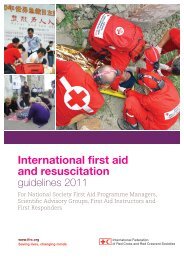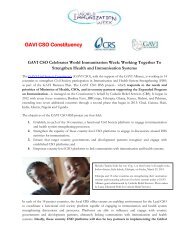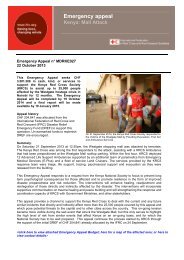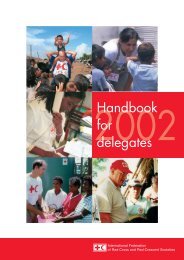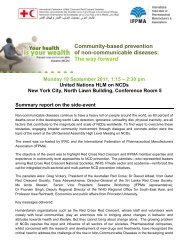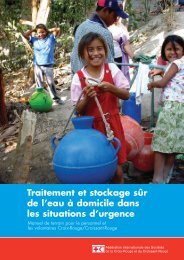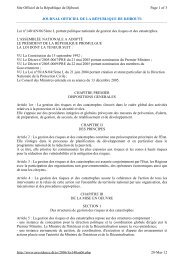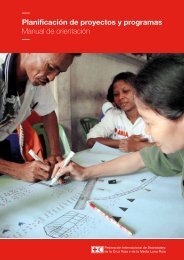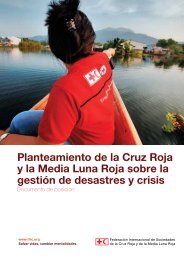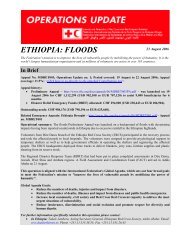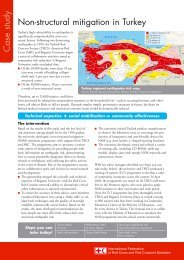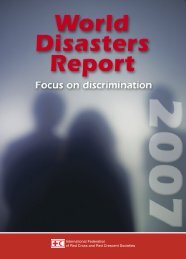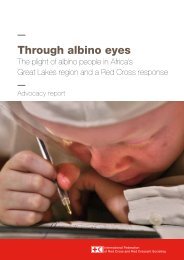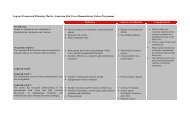World Disasters Report 2010 - International Federation of Red Cross ...
World Disasters Report 2010 - International Federation of Red Cross ...
World Disasters Report 2010 - International Federation of Red Cross ...
You also want an ePaper? Increase the reach of your titles
YUMPU automatically turns print PDFs into web optimized ePapers that Google loves.
However, the scope <strong>of</strong> the upgrading varies from minor improvements such as communal<br />
water taps, paved roads and street lighting, which do little to reduce disaster<br />
risk, to comprehensive improvements to each house and good-quality infrastructure<br />
(piped water and sewers to each house) and services (including schools and healthcare<br />
centres). Upgrading should also include the provision <strong>of</strong> legal tenure <strong>of</strong> the land and<br />
house to the occupants but this is <strong>of</strong>ten avoided due to costs and legal complications,<br />
which may also involve compensation for the landowner.<br />
The concept <strong>of</strong> upgrading implies an acceptance by governments that the settlement<br />
to be upgraded is legitimate and that the inhabitants have a right to live there and the<br />
right to the infrastructure and services that are so central to risk reduction. But the<br />
extent to which it engages the inhabitants and their community organizations in its<br />
design and implementation varies a lot. One <strong>of</strong> the most interesting upgrading initiatives<br />
is that <strong>of</strong> the Thai government because it supports community-driven upgrading,<br />
and scale is achieved by the very large number <strong>of</strong> local initiatives that it supports.<br />
Managed by the Community Organizations Development Institute (CODI), this<br />
channels government funds in the form <strong>of</strong> infrastructure subsidies and housing loans<br />
direct to savings groups formed by low-income inhabitants in informal settlements.<br />
It is these savings groups that plan and carry out improvements to their housing or<br />
develop new housing, and work with local governments or utilities to improve infrastructure<br />
and services. From 2003 to early 2008, within the Baan Mankong or secure<br />
housing programme, CODI approved 512 projects in over 200 urban centres covering<br />
53,976 households, and it plans a considerable expansion <strong>of</strong> the programme within the<br />
next few years. Overall, CODI (and the organization out <strong>of</strong> which it developed, the<br />
Urban Community Development Office) has provided loans and grants to community<br />
organizations that reached 2.4 million households between 1992 and 2007.<br />
This initiative has particular significance in three aspects: the scale; the extent <strong>of</strong><br />
community-involvement; and the extent to which it seeks to institutionalize community-driven<br />
solutions within local governments. Its funding is drawn almost<br />
entirely from domestic resources – a combination <strong>of</strong> contributions from national<br />
and local government and from households and communities. CODI also provides<br />
support to networks <strong>of</strong> community organizations formed by the urban poor, to allow<br />
them to work with municipal authorities, other local actors and national agencies on<br />
city-wide upgrading programmes. It also demonstrates how to regularize illegal land<br />
tenure. Those living in illegal settlements can get legal land tenure by a variety <strong>of</strong><br />
means, including purchasing the land from the landowner supported by a government<br />
loan, negotiating a lease, agreeing to move to another location provided by the<br />
government agency on whose land they are squatting, or agreeing to move to part <strong>of</strong><br />
the site they are occupying in return for tenure (land sharing). CODI also provides<br />
loans to community organizations to lend to their members to help build or improve<br />
their homes.<br />
<strong>World</strong> <strong>Disasters</strong> <strong>Report</strong> <strong>2010</strong> – Focus on urban risk<br />
67



